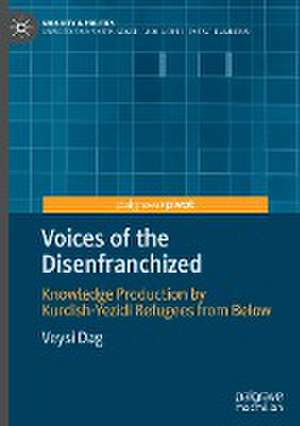Voices of the Disenfranchized: Knowledge Production by Kurdish-Yezidi Refugees from Below: Mobility & Politics
Autor Veysi Dagen Limba Engleză Hardback – 13 feb 2024
Din seria Mobility & Politics
-
 Preț: 383.12 lei
Preț: 383.12 lei -
 Preț: 385.25 lei
Preț: 385.25 lei -
 Preț: 451.65 lei
Preț: 451.65 lei -
 Preț: 450.11 lei
Preț: 450.11 lei -
 Preț: 385.62 lei
Preț: 385.62 lei -
 Preț: 416.92 lei
Preț: 416.92 lei -
 Preț: 419.06 lei
Preț: 419.06 lei -
 Preț: 384.86 lei
Preț: 384.86 lei -
 Preț: 415.18 lei
Preț: 415.18 lei -
 Preț: 384.48 lei
Preț: 384.48 lei -
 Preț: 415.77 lei
Preț: 415.77 lei - 15%
 Preț: 469.41 lei
Preț: 469.41 lei -
 Preț: 385.47 lei
Preț: 385.47 lei -
 Preț: 382.95 lei
Preț: 382.95 lei -
 Preț: 418.07 lei
Preț: 418.07 lei -
 Preț: 422.70 lei
Preț: 422.70 lei -
 Preț: 418.67 lei
Preț: 418.67 lei -
 Preț: 391.61 lei
Preț: 391.61 lei -
 Preț: 385.84 lei
Preț: 385.84 lei -
 Preț: 446.47 lei
Preț: 446.47 lei -
 Preț: 476.95 lei
Preț: 476.95 lei -
 Preț: 376.22 lei
Preț: 376.22 lei - 18%
 Preț: 890.37 lei
Preț: 890.37 lei -
 Preț: 379.30 lei
Preț: 379.30 lei -
 Preț: 482.56 lei
Preț: 482.56 lei -
 Preț: 385.84 lei
Preț: 385.84 lei -
 Preț: 384.09 lei
Preț: 384.09 lei - 18%
 Preț: 722.26 lei
Preț: 722.26 lei -
 Preț: 320.95 lei
Preț: 320.95 lei - 15%
 Preț: 695.34 lei
Preț: 695.34 lei -
 Preț: 319.21 lei
Preț: 319.21 lei - 15%
 Preț: 639.73 lei
Preț: 639.73 lei - 18%
 Preț: 782.57 lei
Preț: 782.57 lei -
 Preț: 383.33 lei
Preț: 383.33 lei -
 Preț: 416.92 lei
Preț: 416.92 lei -

-

-

Preț: 325.36 lei
Nou
Puncte Express: 488
Preț estimativ în valută:
62.27€ • 64.77$ • 51.40£
62.27€ • 64.77$ • 51.40£
Carte tipărită la comandă
Livrare economică 15-29 aprilie
Preluare comenzi: 021 569.72.76
Specificații
ISBN-13: 9783031468087
ISBN-10: 3031468082
Ilustrații: XX, 275 p. 8 illus.
Dimensiuni: 148 x 210 mm
Greutate: 0.5 kg
Ediția:1st ed. 2024
Editura: Springer Nature Switzerland
Colecția Palgrave Macmillan
Seria Mobility & Politics
Locul publicării:Cham, Switzerland
ISBN-10: 3031468082
Ilustrații: XX, 275 p. 8 illus.
Dimensiuni: 148 x 210 mm
Greutate: 0.5 kg
Ediția:1st ed. 2024
Editura: Springer Nature Switzerland
Colecția Palgrave Macmillan
Seria Mobility & Politics
Locul publicării:Cham, Switzerland
Cuprins
1. Introduction.- Chapter 2. Homeland Conditions: “Speaking Kurdish was Equal to a Crime.".- Chapter 3: Escape: "I had seen the deaths of my children with my own eyes.”.- Chapter 4: Asylum Processes and Challenges: “We neither die nor live but receive some breath.”.- Chapter 5: Towards Integration: "We cannot achieve integration without struggle.”.- Chapter 6: Self-Governance from below: “Self-help Services are Necessary to Mitigate our Suffering.- Chapter 7: Exile: Exile: “I have not dreamed of being here since I still live there”.- Chapter 8: Conclusion.
Notă biografică
Veysi Dag is a research fellow of the Minerva Foundation at the Department of International Relations at the Hebrew University of Jerusalem. He is also a research associate at SOAS, University of London. His research interests focus on studies of migration and diaspora, governance, social movements and transnationalism, comparative politics with a focus on refugee and migration policies in Europe, peacebuilding and conflict transformation, and regional policy analysis with a focus on Middle Eastern politics and the Kurdish-Turkish conflict.
Textul de pe ultima copertă
Over a million Kurdish-Yezidi refugees are dispersed across European cities and towns. However, they are neither recognized as a distinct community of stateless immigrants nor as a distinct European ethnic or religious minority. They are frequently utilized as data sources without having a voice to address their challenges. This oral testimony project, moving beyond, but contributing to, conventional academic research, provides these communities with a space to tackle multiple questions in their own languages and with their own voices. The book seeks to answer what drives their departures from their home countries, how they escape, what shapes their lives in receiving cities, and finally, how homeland affairs influence their lives in new environments. By addressing all these themes, this book presents refugee-centric knowledge by and with refugees as objects and subjects of their narratives and transcends neoliberal humanitarian, state-centric, and colonial hegemonic epistemes that limit refugees' epistemic capabilities and viewpoints.
Veysi Dag is a research fellow of the Minerva Foundation at the Department of International Relations at the Hebrew University of Jerusalem. He is also a research associate at SOAS, University of London. His research interests focus on studies of migration and diaspora, governance, social movements and transnationalism, comparative politics with a focus on refugee and migration policies in Europe, peacebuilding and conflict transformation, and regional policy analysis with a focus on Middle Eastern politics and the Kurdish-Turkish conflict.
Caracteristici
Based on 160 intereviews with diverse segments of Kurdish and Yezidi immigrants Explores how the integration processes Kurdish and Yezidi immigrants living in Europe experience Reveals how the politics of the immigrants' homeland influences their lives in their host countries
